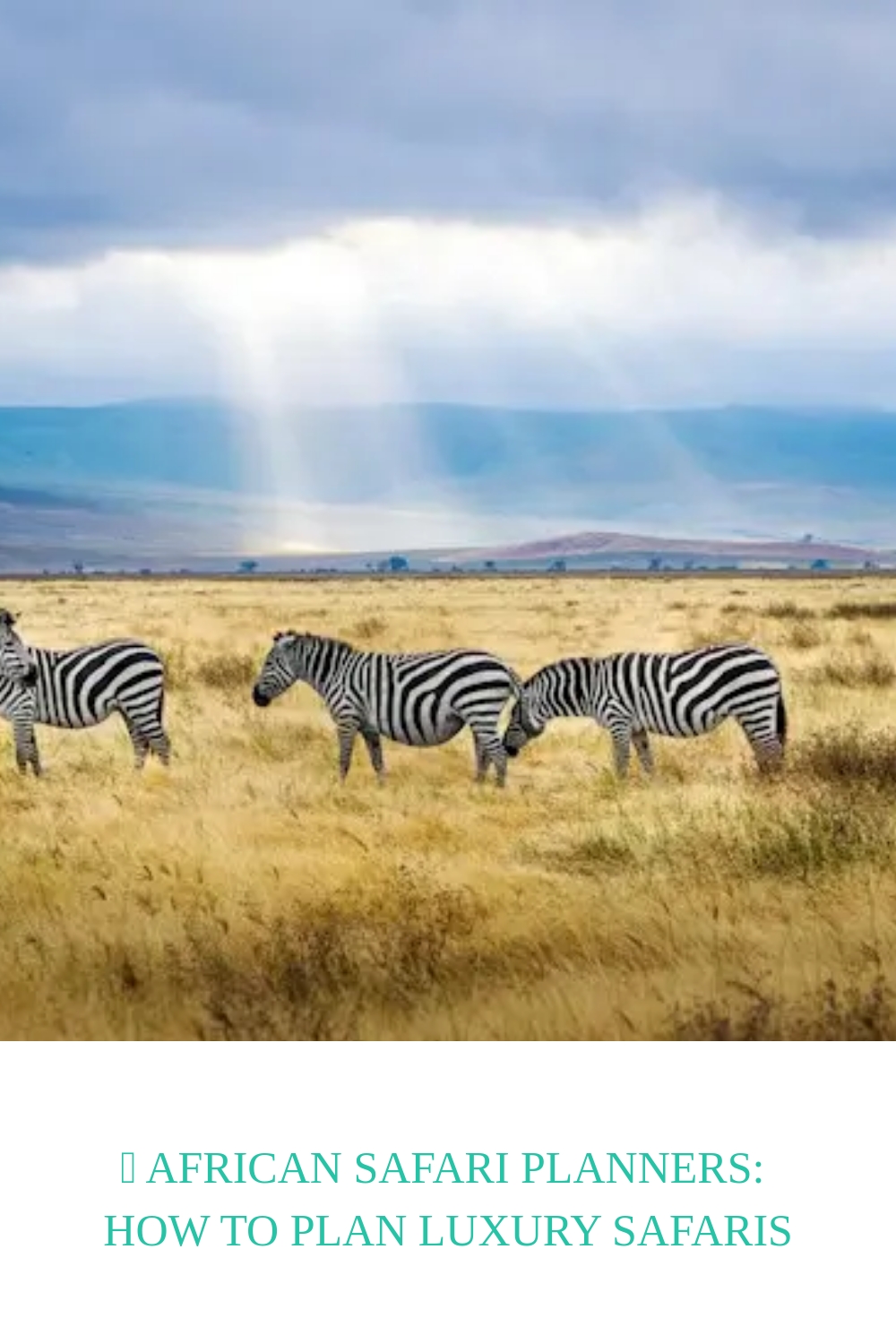Feeling overwhelmed by the endless options and complexities of planning an African safari? Fear not! Our African safari planners are here to effortlessly transform your dream safari into reality.
Imagine a hassle-free journey into the heart of Africa, where every detail is tailored to your desires. From witnessing the great wildebeest migration to peaceful moments observing a pride of lions, we promise a seamless and unforgettable adventure.
Our expert guidance removes the guesswork and anxiety, offering you a meticulously crafted safari experience.
Stay with us, and let’s explore how your African adventure can become a story worth telling for years to come.
📍 Choosing Your African Safari Destination
When choosing African safari planners, picking the right place is key. It’s all about what you want to see and do.
🐾 Popular Safari Countries and Parks
- South Africa: Home to the famous Kruger National Park, you’ll find a huge variety of animals including the Big Five.
- Tanzania: Known for the Serengeti National Park, the great wildebeest migration, and the Ngorongoro Crater for incredible views and wildlife.
- Kenya: Famous for the Maasai Mara National Reserve, where you can see the Big Five and witness part of the wildebeest migration.
| Country | Parks |
|---|---|
| South Africa | Kruger National Park |
| Tanzania | Serengeti National Park, Ngorongoro Crater |
| Kenya | Maasai Mara National Reserve |
🏙️ City Attractions vs 🌳Wilderness
- Cape Town: Situated in South Africa, it combines city life with nearby wilderness, providing a mix of both urban and safari experiences.
- Wilderness-focused: For a full safari focus, parks like the Kruger National Park in South Africa or the Serengeti in Tanzania immerse you in nature.
📅 Deciding When to Go
Choosing the right time for an African safari depends mainly on the weather and what you hope to see. It’s important to think about the seasons and animal activities.
🌧️ Weather and Seasons
Dry Season (May to October):
- Best time for wildlife viewing as animals gather around water sources.
- Peak season with more tourists and higher prices.
Rainy Season (November to April):
- The green season brings lush landscapes but more challenging game viewing.
- Some parks may close due to heavy rains, especially from April to May.
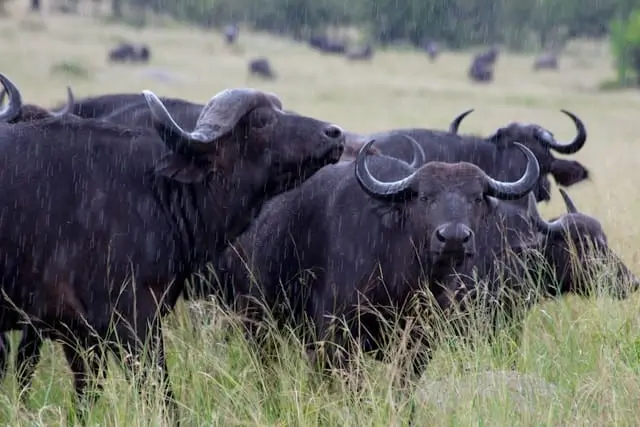
🦁 Wildlife Movements and Events
Great Wildebeest Migration (typically from July to October):
- Witness the dramatic crossing of wildebeest and zebra in the Serengeti and Maasai Mara.
- Plan early as this is a high season event with lots of interest.
Zebra Migration (January to March; November to December):
- Catch the zebra’s movement in Botswana and the Serengeti.
- The right time depends on where you are going; different parks have different peak times for animal movements.
Travel Seasons:
- High season (July to October; December to February): busy parks and higher rates.
- Shoulder season (June and November): fewer tourists, good conditions.
- Low season (March to May): fewer visitors, lower prices, but more unpredictable weather.
🚗 Types of Safari Experiences
When you think of an African safari, imagine yourself immersed in the wild, spotting animals you’ve only seen in books or zoos. You can go with family or on your own and choose from thrilling activities like game drives or walking safaris. This is where African safari planners really help put your plan into action.
👨👩👧👦 Family vs 🚶 Solo Travel
Family Travel
If you’re traveling with your family, safari lodges and camps are great options. They often offer special programs for kids and private spaces where you all can bond after a day of adventure. Imagine sharing a journey through private reserves, watching your kids’ eyes light up at the sight of the Big Five.
- Comfort: Most family-oriented safari lodges cater to your comfort with amenities to make you feel at home.
- Safety: Private guides ensure your family’s safety during game-viewing experiences.
Recommended Reading: 👨👩👧👦 Family Safari in Kenya | Best Tours and Packages
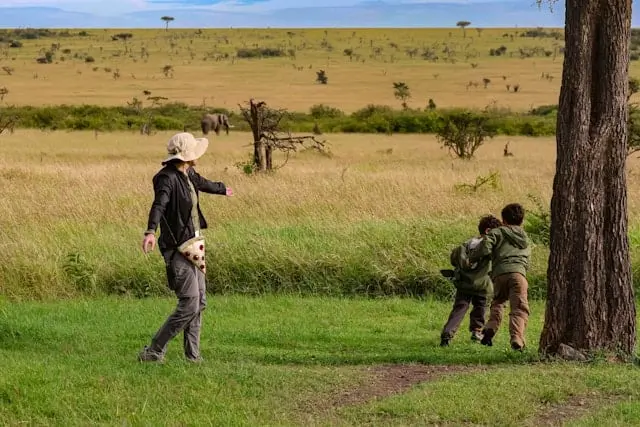
Solo Travel
Travelling by yourself? No problem. Solo travel lets you meet new people and maybe even join group safaris. Plus, you can tailor your day just the way you like.
- Freedom: Choose what you want to do, whether it’s a quiet wildlife safari or an exhilarating hot air balloon ride.
- Flexibility: With a private guide, you can explore as you please and focus on what interests you the most.
🧗 Adventurous Activities
Walking Safaris: Want to feel the ground beneath your feet? A walking safari lets you connect with the land in a rare and exciting way. Follow animal tracks and learn about the smaller wonders of the bush.
- Up-Close Encounters: See wildlife from a new perspective as you safely walk through their natural habitat.
- Intimate Experience: A private guide can give you insights into the ecosystem that you’d miss in a safari vehicle.
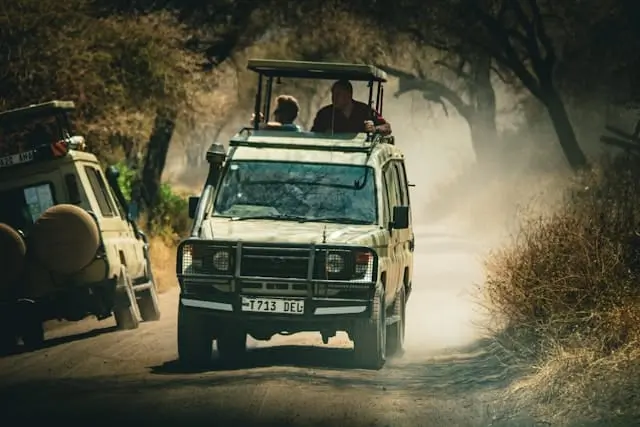
Adventurous Game Drives: In an open 4×4 vehicle, game drives are the classic safari experience. They take you right into the heart of the action for some game-viewing excitement.
- Variety: From dawn until dusk, game drives show you the many faces of the African wilderness.
- Comfort: These drives blend adventure with comfort, letting you cover more ground with ease.
No matter which type of safari you choose, each offers a unique way to experience the magic of Africa. Whether you’re looking for a cultural safari or a bucket-list adventure, it’s an experience of a lifetime.
Recommended Reading: 🚙 Types of African Safari Vehicles (What to Expect)
💃 Integrating Cultural Experiences
When planning your African safari, you’ll find joy in adding local cultures to your adventure. Safari isn’t just about wildlife; it’s also about the people and their ways of life.
👋 Visiting Local Communities
In places like Malawi, you can visit museums to learn about the area’s history. Imagine tasting traditional dishes like Umncweba (dried meat) and Sishwala (maize porridge).
Here’s what you can do for an immersive cultural experience:
- Meet and Greet: Spend time with local families and enjoy homemade meals.
- Participate in Traditions: Learn to dance or craft with local artisans.
You’ll not only have fun but also support the local economy as well.
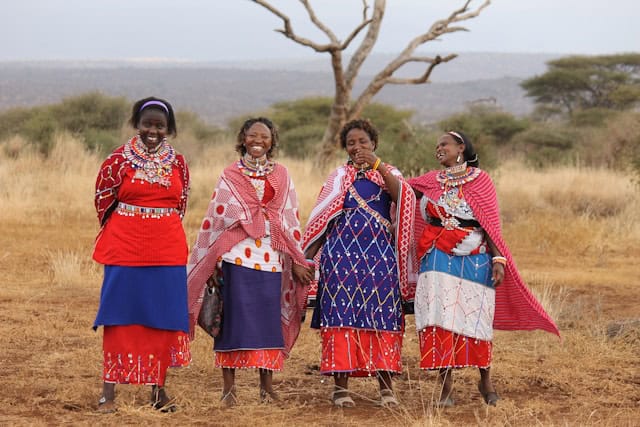
🌱 Learning About Conservation
Conservation is key to keeping Africa beautiful. Here’s how you can help:
- Education: Learn how tourism affects wildlife. This knowledge can shape your safari choices now and in the future.
- Support: Choose safaris that work with environmental conservation organizations. They know how to protect wildlife and support communities.
Your visit means a lot. It can help with conservation efforts and keep the culture alive for years to come.
Recommended Reading: 🌳 17 Most Iconic African Safari Trees (Baobab Included)
🛏️ Accommodations and Amenities
When planning your safari, the right lodge or camp can make your adventure truly unforgettable. It’s all about finding a perfect balance of comfort, services, and an authentic safari atmosphere.
🏠 Choosing the Right Lodge
Location: Pick a lodge in private reserves for fewer crowds and excellent wildlife viewing. They often offer a more exclusive experience.
- Style: Safari lodges come in different styles. You want one that feels right for you. It should blend comfort with the thrill of the wild.
- Amenities: Look for en-suite bathrooms and comfortable bedding. Many lodges offer pools, spas, and WiFi, bringing luxury to the bush.
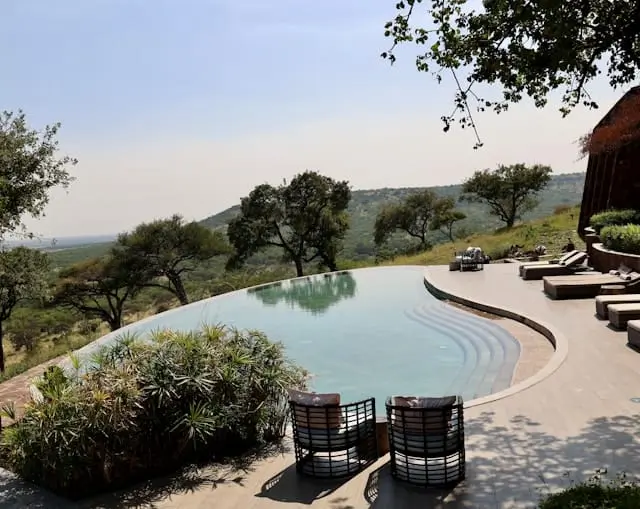
🍽️ Dining and Comfort
Food: Good food is key to enjoying your safari. Lodges often serve both local and international dishes made with fresh ingredients.
- Feel at Home: The best accommodation feels like a home away from home. After a day of adventures, you should come back to a warm meal and a cozy place to rest.
📝 Planning and Booking Your Safari
When you decide to book your African safari, you’re taking the first step towards a trip that’s one of a kind. It’s essential to choose the right African safari planners and understand the different packages offered.
🔍 Selecting African Safari Planners
Finding African safari planners or safari operators should be your first step.
Look for one that has a reputation for safety, reliability, and quality. Expert local guides can make all the difference on your trip. They know the best spots to see wildlife and can teach you about the local culture.
Bushtracks Expeditions and Nat Hab (Natural Habitat Adventures) are popular choices, and they often send exclusive offers to those who sign up for their newsletters.
Make a list of the best safari companies and talk to them. Ask them questions and see if they understand what you’re looking for. Good African safari planners will ask you questions, too. They want to know your expectations to build a tailor-made safari that suits you.
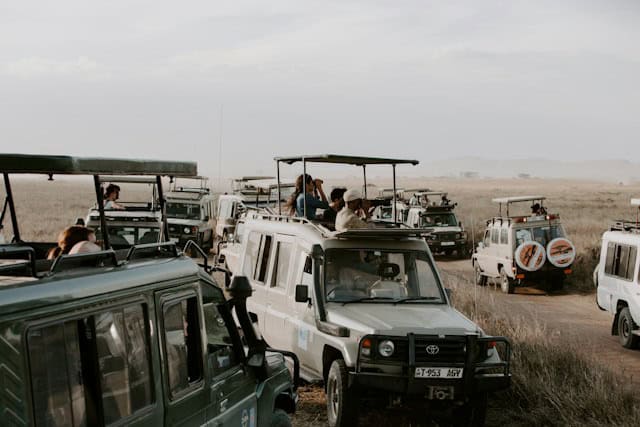
🎁 Understanding Safari Packages
Safari packages vary a lot. Some will offer basic amenities while others give you luxury and exclusivity. The key is to find the right balance for your needs and budget.
Packages should list what’s included, like meals, lodgings, and travel. Some packages might include flights to the game parks. Always check what the package covers so there are no surprises.
Travel documents are a must-have for any international travel. Make sure your chosen package or African safari planners guide you on what you need before you go. They should help with visas, vaccinations, and what to pack.
Booking your safari is exciting! Take your time in selecting the right option, and you’re sure to have the trip of a lifetime.
Recommended Reading: 📍 Top 20 Best African Safari Destinations
🏖️ Post-Safari Options
After an exciting safari adventure, you might want to relax or try new activities. You’ll find wonderful ways to extend your holiday fun with these post-safari options.
🌅 Combining Safari With Beach Holidays
Beach Holidays: If you love the sun and sand, consider heading to the coast after your safari. The beautiful beaches of East Africa are a short flight away. For instance, Zanzibar offers crystal clear waters and soft white sands – it’s perfect for unwinding. Here’s what you can look forward to:
- Relaxation: Sunbathe and recharge on pristine beaches.
- Water Sports: Dive, snorkel, or sail along the stunning coral reefs.
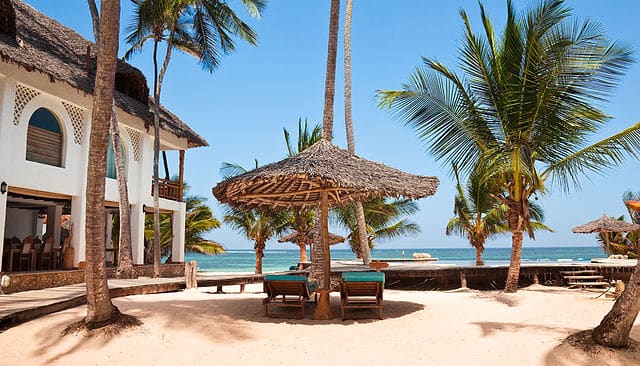
🏄 Other Activities Beyond Wildlife Viewing
Victoria Falls: Witness the awe-inspiring Victoria Falls. This massive waterfall can be a breathtaking sight after the game drives. Here’s what else can you do:
- Adventure Sports: Try bungee jumping or white-water rafting if you’re seeking thrills.
New Adventures: There are more experiences waiting for you, such as:
- Cultural Tours: Learn about local cultures and traditions.
- Scenic Flights: Get a bird’s-eye view of landscapes.
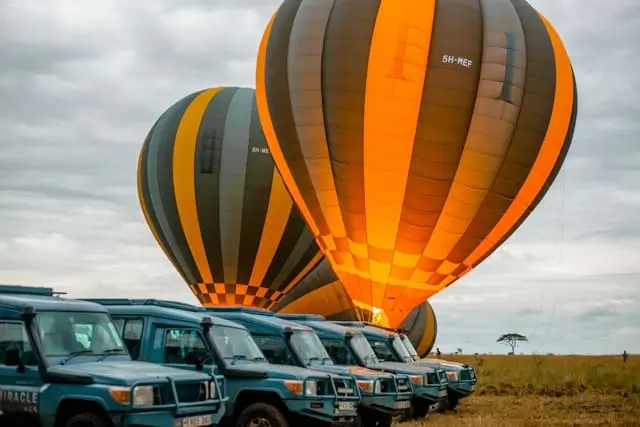
Your safari does not have to end with the last wildlife spotting. Enjoy the opportunity to discover even more wonders.
“Travel is fatal to prejudice, bigotry, and narrow-mindedness.”
Mark Twain
❓ Frequently Asked Questions (FAQs) about African Safari Planners
Before you embark on a safari adventure, you likely have some questions. Read more about safari tours in our growing list of articles.
Below, you’ll find answers to common questions to help you prepare for the trip of a lifetime.
💰 What is the average cost of an African safari trip?
- The cost of an African safari can vary significantly depending on the country, level of luxury, and the type of safari.
- In Tanzania and Kenya, which are popular for safaris, prices per person per night can range from $550 to $3,200 for luxury safaris, depending on the season and level of comfort.
- Other countries like South Africa, Namibia, Botswana, Zambia, and Zimbabwe also offer a range of safari experiences, with costs varying based on the luxury level and season. For example, in South Africa, prices range from $500 to $1,850 per person per night for a luxury experience.
- On average, budget safaris can start from around $225 per day, while mid-range options may cost around $350 to $500 per day. Luxury safaris can start from $550 and go upwards of $1,000 per day.
- For a week-long trip, costs in destinations like Tanzania, Kenya, South Africa, and Botswana can vary from $5,000 to over $19,000 per person, depending on the season and the level of luxury.
Recommended Reading: 📝 How to Plan a Tanzania Budget Safari (Tours & Parks)
🤔 How do you arrange an African safari?
- To arrange an African safari, start by deciding your preferred destination, the level of luxury, the type of experiences (e.g., game drives, walking safaris, cultural tours), and your budget.
- Research various African safari planners and read reviews to ensure they are reputable and match your expectations.
- Consider the time of year you wish to travel, as this can affect both the cost and the wildlife viewing opportunities.
- Contact the chosen African safari planners to discuss your preferences, and they will help tailor a safari experience that suits your needs and budget.
⏳ How far in advance do you need to plan an African safari?
It’s advisable to plan and book your African safari several months to a year in advance. This allows time for thorough research, finding the best deals, and ensuring availability, especially if you’re planning to travel during peak seasons like the Great Migration.
